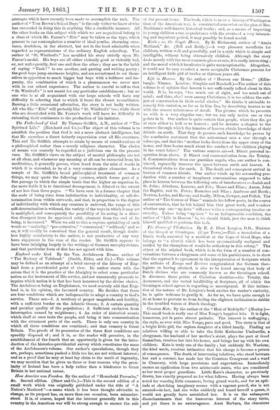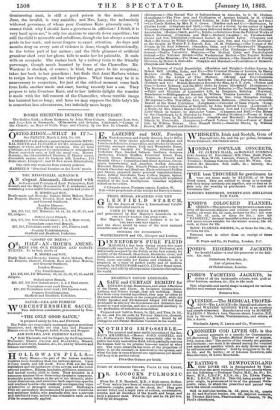Countess Kate. By the author of the "Heir of Redclyffe."
(Mozley.)— This small book is really one of Miss Yonge's happiest hits. It is light, humorous, yet in parts almost pathetic. The interest is unflagging ; the style, as ever with Miss Yonge, pure and good. The story is that of a bright little girl, the orphan daughter of a titled family. Finding no relatives willing or able to take the little Katharine Umfraville, a clergyman, the husband of her mother's sister, plays the part of Good Samaritan, receives her into his house, and brings her up with his own children. Kate is truly one of the family ; but suddenly Mr. Wardour, the kind uncle, receives intimation that his charge is become a person of consequence. The death of intervening relatives, who stood between her and a coronet, has made her the Countess Craegwent and a ward in Chancery, with large provisions and expectations. Immediately ensues an application from two aristocratic aunts, who are considered as her most proper guardians. Little Kate's character, as previously drawn, has exactly prepared us for what follows. Having always been noted for weaving little romances, loving grand words, and for an apti- tude at sketching imaginary scenes with a vagrant pencil, she is not amazed—in fact, had she woke suddenly and found herself a queen, it would not greatly have astonished her. It is on the subsequent disenchantments that the humorous interest of the story turns, and yet there is no extravagance. Aunt Barbara, the obnoxious domineering aunt, is still a good person in the main. Aunt Jane, the invalid, is very amiable ; and Mrs. Lucy, the melancholy widowed governess, of whom poor Countess Kate piteously says, "I cannot think why I should have a governess in affliction ! I think it is very bard upon me," is only too anxious to smooth down asperities ; but still the child is miserable and rebellious, though she has always a certain pride in her rank, and never forgets to exact attention. As days and months drag on every sort of violence is done, though unintentionally, to the better part of her nature ; and the little glimmer of artificial grandeur shed over her gloom fails to make her lot palatable. It ends with an escapade. She rushes back by a railway train to the friendly parsonage, though much haunted by fears of the Chancellor. Mr. Wardour is shocked, of course ; is kind, but grave in his reception ; takes her back to her guardians ; but finds that Aunt Barbara wishes to resign her charge, and has other plans. What these may be it is unnecessary to conjecture, for just at the critical moment come back from India another uncle and aunt, having recently lost a son. They propose to take Countess Kate, and to her infinite delight the transfer is made with the full consent of the Chancellor, whose terrible image has haunted her so long ; and here we may suppose the little lady's life is somewhat less adventurous, but infinitely more happy.































 Previous page
Previous page